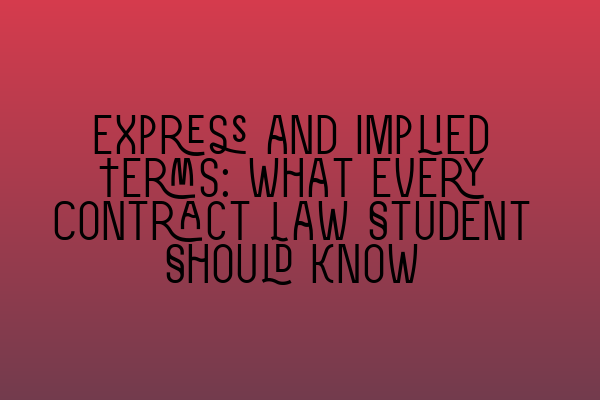Express and Implied Terms: What Every Contract Law Student Should Know
As a contract law student, understanding the concept of express and implied terms is crucial to your success in this field. These terms play a vital role in the formation and interpretation of contracts, and knowing how they work can greatly influence the outcome of a legal case. In this blog post, we will discuss what express and implied terms are, how they differ, and why they are important in contract law.
What are Express Terms?
Express terms are the specific clauses or provisions that the parties to a contract agree upon and include in the written or oral agreement. These terms can cover a wide range of issues, such as price, delivery, payment terms, and warranties. Express terms are often explicitly stated in the contract and are legally binding on the parties involved. If one party fails to fulfill the obligations outlined in the express terms, they can be held liable for breach of contract.
For example, in a contract for the sale of goods, the express terms may include details about the quantity, quality, and specifications of the goods. If the seller delivers goods that do not meet the specifications outlined in the contract, they would be in breach of the express terms.
Express terms can be either oral or written. However, it is always best to have written express terms to avoid any confusion or disputes that may arise from verbal agreements. Written express terms provide clear evidence of the parties’ intentions and can prevent misunderstandings down the line. It is also important to ensure that the express terms are properly drafted to avoid any ambiguity or uncertainty.
To learn more about the importance of contract drafting and negotiation skills, check out our related article on The Art of Contract Drafting and Negotiation: Skills Every Solicitor Should Master.
What are Implied Terms?
Implied terms, on the other hand, are not expressly stated by the parties but are instead inferred by the court based on the nature of the contract, the parties’ conduct, and the relevant legal principles. Implied terms fill in the gaps or supplement the express terms of a contract to give effect to the parties’ presumed intentions.
There are two types of implied terms: terms implied by statute and terms implied by common law.
Implied Terms by Statute
Statutory implied terms are those that are included in contracts by operation of law. These terms are imposed by various statutes in order to protect the interests of the parties involved and promote fairness in contractual relationships. Examples of statutory implied terms in contract law include the Sale of Goods Act 1979 (which implies terms about the quality, fitness for purpose, and title of goods) and the Consumer Rights Act 2015 (which implies terms about the quality, fitness for purpose, and conformity of goods).
If you’re interested in learning more about legal challenges and pitfalls, our related article on Legal Challenges and Pitfalls: Navigating the Complexities of the Legal System can provide valuable insights.
Implied Terms by Common Law
Common law implied terms are those that have been developed by the courts over time through their interpretation of the law and their consideration of public policy. These terms are implied into certain types of contracts based on established legal principles and the reasonable expectations of the parties involved. For example, in employment contracts, there is an implied duty of trust and confidence between employers and employees.
It is important to note that not all contracts will have implied terms, and the presence of implied terms will depend on the circumstances of each case. The courts will consider factors such as the nature of the contract, the intentions of the parties, and the specific terms of the agreement when determining whether to imply terms.
Why are Express and Implied Terms Important?
Express and implied terms are essential in contract law because they help to clarify the rights and obligations of the parties involved. They provide a framework for interpreting and enforcing contracts and ensure that the parties are held accountable for their actions. By examining the express and implied terms, the court can determine whether a breach of contract has occurred and what remedies are available to the injured party.
Understanding express and implied terms is also crucial when it comes to contract negotiation and drafting. By clearly defining the express terms, parties can anticipate potential issues and allocate risks appropriately. Including well-drafted express terms in a contract can minimize the chances of disputes and protect the interests of the parties involved.
Furthermore, knowledge of implied terms allows contract law students to identify gaps in contracts and evaluate the potential rights and liabilities that may arise out of these gaps. This can be particularly important when dealing with contracts that have not been properly drafted or do not cover all eventualities.
To learn more about the importance of mentorship in the legal field, check out our related article on Mentorship for Aspiring Solicitors: Nurturing Talent in the Legal Field.
In Conclusion
Express and implied terms are fundamental concepts in contract law that every aspiring solicitor should understand. By familiarizing yourself with these terms, you can navigate the complexities of contract formation and interpretation more effectively. Remember, express terms are the specific clauses agreed upon by the parties, while implied terms fill in the gaps and ensure fairness in contractual relationships. Both types of terms play an essential role in clarifying rights and obligations, resolving disputes, and protecting the interests of the parties. So, make sure to master the understanding of express and implied terms to excel in your future legal career.
To explore alternative dispute resolution and gain insights on effective approaches to legal conflicts, visit our related article on Exploring Alternative Dispute Resolution: An Effective Approach to Legal Conflicts.
And if you’re seeking guidance on your legal journey, don’t miss our related article on Mentorship for Aspiring Solicitors: Finding Guidance on Your Legal Journey.
